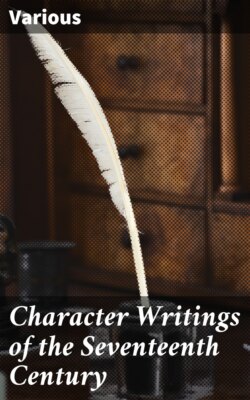Читать книгу Character Writings of the Seventeenth Century - Various - Страница 40
На сайте Литреса книга снята с продажи.
A SAILOR
ОглавлениеTable of Contents
Is a pitched piece of reason caulked and tackled, and only studied to dispute with tempests. He is part of his own provision, for he lives ever pickled. A fore-wind is the substance of his creed, and fresh water the burden of his prayers. He is naturally ambitious, for he is ever climbing; out of which as naturally he fears, for he is ever flying. Time and he are everywhere ever contending who shall arrive first; he is well-winded, for he tires the day, and outruns darkness. His life is like a hawk's, the best part mewed; and if he live till three coats, is a master. He sees God's wonders in the deep, but so as rather they appear his playfellows than stirrers of his zeal. Nothing but hunger and hard rocks can convert him, and then but his upper deck neither; for his hold neither fears nor hopes, his sleeps are but reprievals of his dangers, and when he wakes 'tis but next stage to dying. His wisdom is the coldest part about him, for it ever points to the north, and it lies lowest, which makes his valour every tide overflow it. In a storm it is disputable whether the noise be more his or the elements, and which will first leave scolding; on which side of the ship he may be saved best, whether his faith be starboard faith or larboard, or the helm at that time not all his hope of heaven. His keel is the emblem of his conscience, till it be split he never repents, then no farther than the land allows him, and his language is a new confusion, and all his thoughts new nations. His body and his ship are both one burden, nor is it known who stows most wine or rolls most; only the ship is guided, he has no stern. A barnacle and he are bred together, both of one nature, and it is feared one reason. Upon any but a wooden horse he cannot ride, and if the wind blow against him he dare not. He swerves up to his seat as to a sail-yard, and cannot sit unless he bear a flagstaff. If ever he be broken to the saddle, it is but a voyage still, for he mistakes the bridle for a bowline, and is ever turning his horse-tail. He can pray, but it is by rote, not faith, and when he would he dares not, for his brackish belief hath made that ominous. A rock or a quicksand plucks him before he be ripe, else he is gathered to his friends at Wapping.
